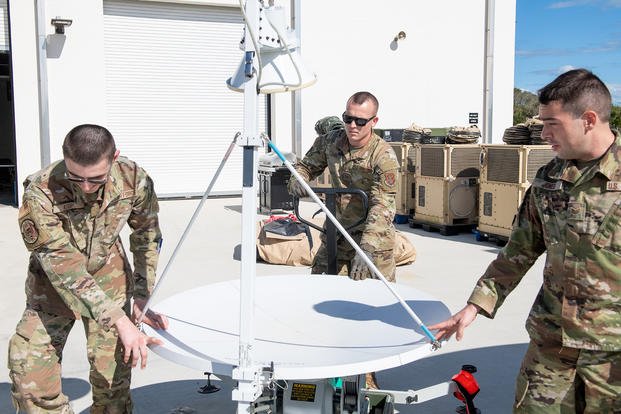
Air National Guard leaders and enlisted Guardsmen on Friday called a legislative proposal to move units focused on space missions to the Space Force a threat to their existence and also said many of those personnel would rather retire or retrain into another job instead.
In a media roundtable with reporters, officers and enlisted from the Alaska, Colorado and Hawaii Air National Guards took aim at the Air Force proposal, which seeks to move units in their states into the Space Force, usurping their state governors’ authority and the wishes of most of the Guardsmen stationed in those areas. Internal polling from 14 Air National Guard units in seven states shows anywhere from 70% to 86% have no desire to become Space Force Guardians.
“Our internal survey indicates about 70% of our personnel would retrain or retire rather than join the Space Force,” Air Force Col. Michael Griesbaum, commander of the Alaska Air National Guard’s 168th Wing, told reporters Friday. “In our particular case, that would really represent an existential threat to the national security of the United States because the Space Force does not have the experience to replace my space operators who depart.”
Rebukes from Air National Guard officials join a chorus of criticisms for the proposal, including a letter of opposition signed by the governors of 48 states as well as five U.S. territories earlier this week.
“Governors must maintain full authority as commanders in chief of these assets to effectively protect operational readiness and America’s communities,” according to the letter, which was promoted by the National Governors Association. “Legislation that sidesteps, eliminates or otherwise reduces governors’ authority within their states and territories undermines long-standing partnerships, precedence, military readiness and operational efficacy.”
Air Force officials’ legislative proposal 480 to Congress would change the status of Air National Guard units conducting space operations “from a unit of the Air National Guard of the United States to a unit of the United States Space Force; deactivate the unit; or assign the unit a new federal mission” and would do so “without the approval of its governor,” Military.com reported last month.
Air Force Secretary Frank Kendall, in response to Military.com last month, waived off the concerns, saying worries that the proposal would set a precedent undermining state governors’ authority were overblown.
“We’ve had much, much more political attention over this than it deserves,” Kendall said. “We need a way to integrate these space capabilities, which are very valuable to us, into the Space Force. This is a unique situation. I have no indication that either the Air Force or Army Guard, anybody, is contemplating any other changes.”
But Air National Guard leaders have expressed concern, saying it would set a clear precedent for other services to potentially take more resources from the National Guard model.
“Nothing legislatively ever happens once,” Griesbaum said. “If LP 480 is successful, it will open the door to a wholesale harvesting of National Guard resources, both from the Air National Guard and the Army National Guard to the regular components.”
Enlisted Air National Guardsmen in space missions have concerns about losing the ties to their local communities, as well as potentially uprooting their families or civilian careers by being transferred to the active-duty force and the uncertainty that could come with that transition.
“I love this nation, and I love this state,” Air Force Staff Sgt. Robert Brown with the Colorado Air National Guard’s 233rd Space Group said. “I wanted to continue my service through the Air National Guard, and I didn’t run the risk of getting stationed anywhere far from home. Currently, my wife and I are expecting a daughter in just about a month, so that really enforces our needs.”
Since 2019, when the Space Force became the newest service branch under the Department of the Air Force, debates and conflicts have sprung up over what to do with the roughly 1,000 part-time Air National Guardsmen across 14 units operating space-related missions in Alaska, California, Colorado, Florida, Hawaii, New York and Ohio.
Kendall as well as some members of Congress say that the number of those affected would be less than that. But Guard officials are skeptical, saying officials are not counting all the units and all the states supporting those missions, as well as the support personnel.
Brig. Gen. Michael Bruno, director of joint staff for the Colorado National Guard, told reporters Friday that space operators with his state are currently deployed overseas helping with missions, and he worries that if the legislative proposal is approved, it may leave them with an uncertain future.
“These space professionals may not have a military job to come back to when they return,” he said. “They volunteered to serve and sacrifice for their nation, state and communities. I can only imagine how they and their families must feel if we break that trust with them.”






